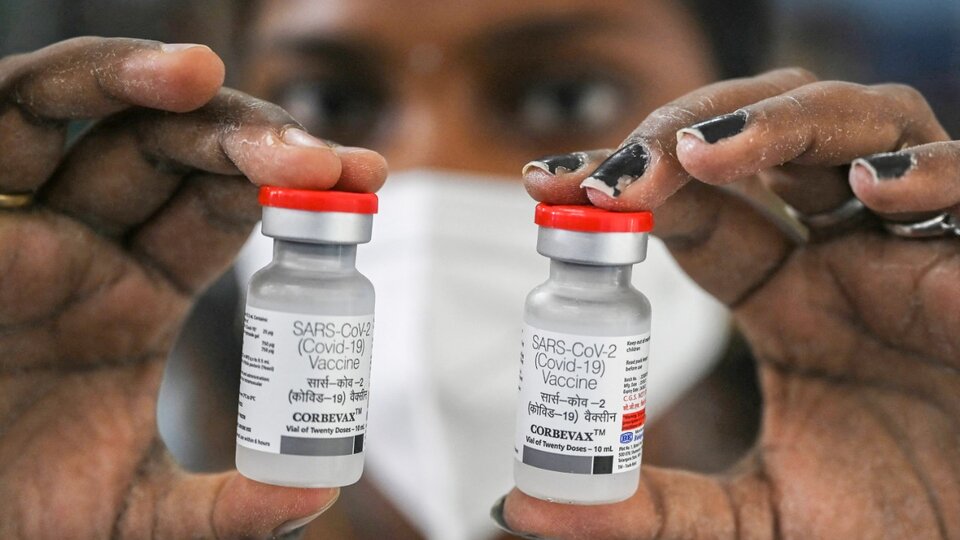Two years after the World Health Organization declared the Covid-19 pandemic and a year and a half after emerging countries demanded the release of vaccine patents, the World Trade Organization (WTO) gave a first step to “temporarily” lift intellectual property rights.
The agreement would have a limit of 5 years and only for countries that have manufactured less than 10% of the vaccines exported in 2021.
The European Union (EU), the United States, India — the country that registered daily infection records— and South Africa –where the variant arose Omicron— reached an agreement in principle to agree on an exemption that allows multiplying and geographically diversifying the production of immunizers.
The director general of the WTO, Ngozi Okonjo-Iweala, defined the commitment between the four countries as “a great step forward”, although she clarified that “there is still a lot of work to do to obtain the support of all the members”. It is that the approval of all member countries is still lacking, in a context in which cases are increasing again in Europe and Asia.
This principle of agreement is known at a time when coronavirus infections are rising again in a large part of European and Asian countries, although this does not correspond to an increase in deaths at the same level.
Where would the Covid vaccine patent release agreement apply?
The details of the text were not revealed, but diplomatic sources revealed that it is limited to vaccines against Covid-19 and leaves out treatments and tests, as proposed by the United States, which, in May of last year, surprised by abandoning its historic defense of intellectual property rights to join the more than 100 countries, including Argentina, that gave their explicit support to the temporary suspension of patents.
The principle of agreement also places a limit on the number of years in which it will be in force, from three to five years, as well as on the countries in which the exemption will be effective: nations that have manufactured less than 10% of world exports of vaccines in 2021.
This would leave out the EU, the United States and China, where laboratories should still have the rights to the inoculants they produce, but it would reach India, headquarters of important companies in the sector and a major supplier to Covax, the Organization’s multilateral mechanism. World Health Organization (WHO) so that drugs reach countries with fewer resources.
The exemption, according to information revealed by the Politico website, would not be for domestic purposes only, which means that a vaccine-producing country can export to another member of the consortium.
The negotiation for the release of patents
On October 2, 2020, before the approval and massive use of any immunizer, South Africa and India presented a proposal to the WTO to suspend intellectual property rights, anticipating that few laboratories would try to monopolize the demand.
Since then, the debate has been paralyzed, mainly due to the position of the EU, the United Kingdom and Switzerland, headquarters of the large pharmaceutical companies, which are committed to making “the use of compulsory licenses” more flexible, which would allow more companies to develop generic drugs in exchange of the payment of a canon to those who own the patents.
Several humanitarian NGOs and some international agencies, including the WHO, consider that a suspension of rights is essential to facilitate the sharing of knowledge and the rapid multiplication of vaccine production sites.
“The limitation of the exemption for vaccines could be lethal for those who get sick with Covid-19, particularly where coverage is low. The eligibility criteria could exclude countries with production capacity,” he warned, before the information is known. fine print of the pre-agreement, Dimitri Eynikel, adviser to Doctors Without Borders (MSF).
For its part, the Spanish association Salud por Derecho announced that what “should be received as good news” generates “concern”, since “it is still a decaffeinated version of the one originally presented by India and South Africa.”
The pandemic is not over yet
In Germany, the 1,600 new positives per hundred thousand inhabitants were exceeded today for the first time, Italy registered more than 85,000 infections, and in France a peak of 120 to 150 thousand is expected at the end of March, while in Austria infections were dispersed with the lifting of restrictions.
Overshadowed by news of the Russian invasion of Ukraine, the pandemic continues and cases in China and other Asian countries have caused the global curve of weekly Covid-19 infections to rise again, according to the WHO.
The Asian giant substantially increased the number of hospital beds after announcing a rise in positives due to the spread of the Omicron variant, which has millions of people confined due to the application of its strategy, 0 Covid, which maximizes restrictions in the face of the appearance of a possible minimum source of contagion.
South Korea today reported more than 400,000 new cases, a record for the country that began to ease restrictions despite the wave of infections also driven by Omicron.
This increase in infections in various parts of the world must serve as a “warning” for the Americas that the virus is not under control despite the decrease in infections in the region, the Pan American Health Organization warned today.
In this framework, cases of the Deltacron variant have already been detected, which combines the Delta and Ómicron variants, although for now it has “a low level of circulation”, according to the first WHO analysis that does not rule out, however, that this initial impression is related to the drop in the number of Covid-19 tests in most of the world.
The Brazilian health authorities reported the day before that they had confirmed two infections with Deltacron, but today they rectified and said that these are cases that are still being investigated.
–


